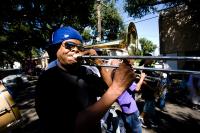 After Slavery was abolished, there were many Social Aid and Pleasure Clubs formed in New Orleans which were benevolent societies that organized social activities, provided funerals for the members and helped maintain the tradition alive. When people doubted that New Orleans could be reborn form Hurricane katrina, it was those societies and many other traditions that live in the hearts of the people that motivated them to return and rebuild their lives in the city they love.
After Slavery was abolished, there were many Social Aid and Pleasure Clubs formed in New Orleans which were benevolent societies that organized social activities, provided funerals for the members and helped maintain the tradition alive. When people doubted that New Orleans could be reborn form Hurricane katrina, it was those societies and many other traditions that live in the hearts of the people that motivated them to return and rebuild their lives in the city they love.
City
17.11.2010 | by José Fernandes
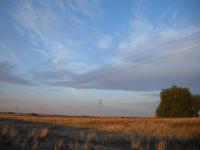 Ruy Duarte de Carvalho, who recently left this world, lived a life associated to traveling, which incidentally is one of the favorite themes of his books - a production that goes beyond a dozen, including poetry, fiction and essay. With the course of agricultural regent, which he concluded in 1960, went through big part of the Angolan territory working on coffee plantations and also in traditional agro-pastoral production, taking care of sheep in Caranculo, in the (then) province of Moçâmedes, now Namibe.
Ruy Duarte de Carvalho, who recently left this world, lived a life associated to traveling, which incidentally is one of the favorite themes of his books - a production that goes beyond a dozen, including poetry, fiction and essay. With the course of agricultural regent, which he concluded in 1960, went through big part of the Angolan territory working on coffee plantations and also in traditional agro-pastoral production, taking care of sheep in Caranculo, in the (then) province of Moçâmedes, now Namibe.
Ruy Duarte de Carvalho
13.11.2010 | by Marta Lança
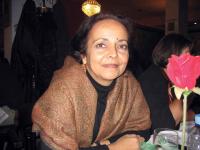 born in Huíla, in the midst of an unjust colonial society. There were pastors there. What I owe to the Nyaneka society is poetry, music, the sense of smell, southern orientation. Contact (for anyone in the process of assimilation) was forbidden to us. And it was for this very reason stronger. To learn and to know who they were and who we were was always linked to the paradigm of orality, the flame that wells from being of a place, being aware of the cycles, respect for difference, and an abhorrence of injustice.
born in Huíla, in the midst of an unjust colonial society. There were pastors there. What I owe to the Nyaneka society is poetry, music, the sense of smell, southern orientation. Contact (for anyone in the process of assimilation) was forbidden to us. And it was for this very reason stronger. To learn and to know who they were and who we were was always linked to the paradigm of orality, the flame that wells from being of a place, being aware of the cycles, respect for difference, and an abhorrence of injustice.
Face to face
07.11.2010 | by Pedro Cardoso
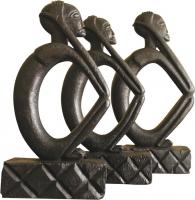 Kundi had succeeded Iala Maku, and now he was getting old. Harmony among the peoples of Lunda was getting strained. Who would succeed the old man Kundi? One of the boys? Tchinguri or Tchinhama? Or the girl, Lwéji, the youngest daughter of his second wife? They say the brothers could not get on together. Tchinguri was more dashing, Tchinhama more thoughtful. However that may be, one day the boys burst into their father's tchota (palace), drunk as lords on palm wine and went for the old man because both of them wanted to take over. The old man was half blind and dying, but he cursed them and told them there and then that neither of them would take his place. He called the macotas (the elders) and said he was handing over to Lwéji, the boys' half-sister. And so the Muatyânvua empire started in heh village of Mussumba, with the marriage of Lwéji, the new Lunda queen, to the Baluba hunter Tchibinda Ilunga.
Kundi had succeeded Iala Maku, and now he was getting old. Harmony among the peoples of Lunda was getting strained. Who would succeed the old man Kundi? One of the boys? Tchinguri or Tchinhama? Or the girl, Lwéji, the youngest daughter of his second wife? They say the brothers could not get on together. Tchinguri was more dashing, Tchinhama more thoughtful. However that may be, one day the boys burst into their father's tchota (palace), drunk as lords on palm wine and went for the old man because both of them wanted to take over. The old man was half blind and dying, but he cursed them and told them there and then that neither of them would take his place. He called the macotas (the elders) and said he was handing over to Lwéji, the boys' half-sister. And so the Muatyânvua empire started in heh village of Mussumba, with the marriage of Lwéji, the new Lunda queen, to the Baluba hunter Tchibinda Ilunga.
To read
31.10.2010 | by Carlos Lousada
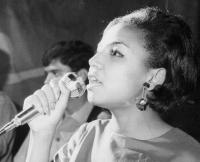 She lives now in France, where she founded the association for Angolan artists resident there. Her companion is a Croatian musician who also “does a touch of painting.” Whenever there’s a chance, she’s up on stage. And there’s no better end than her own words: “every time I sing, I live the moment with the same amazement as the butterfly on the only day of its life, perched on the coloured petal of a flower.”
She lives now in France, where she founded the association for Angolan artists resident there. Her companion is a Croatian musician who also “does a touch of painting.” Whenever there’s a chance, she’s up on stage. And there’s no better end than her own words: “every time I sing, I live the moment with the same amazement as the butterfly on the only day of its life, perched on the coloured petal of a flower.”
Stages
27.10.2010 | by Mário Rui Silva
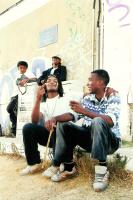 I set out to understand the modes of sociability of the Red Eyes Gang, a group of youths from Arrentela, Seixal, on the outskirts of Lisbon. The majority of them are children of African immigrants from countries that were formerly Portuguese colonies, and live in socioeconomic conditions well below those of the Portuguese. All were born in Portugal or arrived very young, never knowing their parents' countries of origin. However, they appropriate some of their ethnic and cultural heritages because of the stigmatization and racism to which they are subjected, reworking their condition of being poor and black. They do not mechanically reproduce the way of life and ethnic influences of their families, but reinvent them with imagination, thus producing positive statements about themselves.
I set out to understand the modes of sociability of the Red Eyes Gang, a group of youths from Arrentela, Seixal, on the outskirts of Lisbon. The majority of them are children of African immigrants from countries that were formerly Portuguese colonies, and live in socioeconomic conditions well below those of the Portuguese. All were born in Portugal or arrived very young, never knowing their parents' countries of origin. However, they appropriate some of their ethnic and cultural heritages because of the stigmatization and racism to which they are subjected, reworking their condition of being poor and black. They do not mechanically reproduce the way of life and ethnic influences of their families, but reinvent them with imagination, thus producing positive statements about themselves.
To read
21.10.2010 | by Otávio Raposo
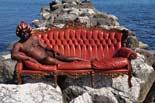 Fonti Gallery presents the second solo exhibition of the Angolan photographer Kiluanji Kia Henda. The show is a project developed by the artist between Venice and Luanda in the framework of the international residency programme Art Enclosures produced and created by Fondazione Venezia and organized in collaboration with Polymnia and Bevilacqua La Masa Foundation in Venice.
Fonti Gallery presents the second solo exhibition of the Angolan photographer Kiluanji Kia Henda. The show is a project developed by the artist between Venice and Luanda in the framework of the international residency programme Art Enclosures produced and created by Fondazione Venezia and organized in collaboration with Polymnia and Bevilacqua La Masa Foundation in Venice.
Face to face
21.10.2010 | by Kiluanji Kia Henda
 Paulo Flores is a musician, singer and composer. In terms of music in Angola, his voice is unmistakable. His career spans 20 years, he has made 11 records, he has placed his stamp on Angolan music, and he has renovated Angolan culture. His music pays tribute to his homeland, his lyrics put him in the vanguard. His last work is the trilogy “ExCombatentes” (Veterans). The three parts (“Viagem” (Journey), “Sembas” (Semba Music) ande “Ilhas” (Islands) is nothing short of a virtuoso display of talent.
Paulo Flores is a musician, singer and composer. In terms of music in Angola, his voice is unmistakable. His career spans 20 years, he has made 11 records, he has placed his stamp on Angolan music, and he has renovated Angolan culture. His music pays tribute to his homeland, his lyrics put him in the vanguard. His last work is the trilogy “ExCombatentes” (Veterans). The three parts (“Viagem” (Journey), “Sembas” (Semba Music) ande “Ilhas” (Islands) is nothing short of a virtuoso display of talent.
Face to face
21.10.2010 | by Marta Lança
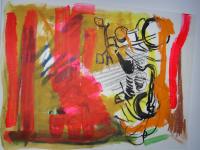 He’d spend hours scripting the captions, and if the papers changed them he’d write to the picture editor to complain. H’s obsession with providing the absolute explanation of the context of his photographs became compulsive. Sometimes he’d write several paragraphs detailing the personal histories of each person — or body — in the picture. He’d also include information about how he’d been feeling when he took the picture, whether he was scared, happy, jealous or guilty.
He’d spend hours scripting the captions, and if the papers changed them he’d write to the picture editor to complain. H’s obsession with providing the absolute explanation of the context of his photographs became compulsive. Sometimes he’d write several paragraphs detailing the personal histories of each person — or body — in the picture. He’d also include information about how he’d been feeling when he took the picture, whether he was scared, happy, jealous or guilty.
To read
11.10.2010 | by Lara Pawson
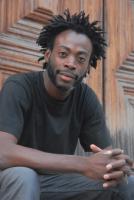 When it comes to being black, they are much more open minded and the struggle for work is taken seriously. They still complain, of course. But the difference is that a black actor in Brazil is a Brazilian, but in Portugal you feel like an immigrant - and how! If we are excluded from all sectors of society, what can we do? But there’s the other side of the coin: what do black actors do to counteract this situation?
When it comes to being black, they are much more open minded and the struggle for work is taken seriously. They still complain, of course. But the difference is that a black actor in Brazil is a Brazilian, but in Portugal you feel like an immigrant - and how! If we are excluded from all sectors of society, what can we do? But there’s the other side of the coin: what do black actors do to counteract this situation?
Face to face
11.10.2010 | by Marta Lança
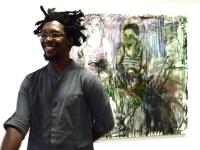 "René Tavares translates lines, dashes, blots, a personal synthesis of his own identity always in process (“unfinished”) set in constant movement in between past and present references".
The last exhibition at Galeria Bozart (Lisbon).
"René Tavares translates lines, dashes, blots, a personal synthesis of his own identity always in process (“unfinished”) set in constant movement in between past and present references".
The last exhibition at Galeria Bozart (Lisbon).
Face to face
07.10.2010 | by Lúcia Marques
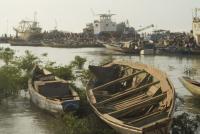 In July 2009, the campaign for the second round of presidential elections in Guinea-Bissau had been on the streets for a week. But the leading players are not only Kumba Ialá and Malam Bacai Sanhá, but also the people, who reject violence and fear the power of the military and narcotraffickers.
In July 2009, the campaign for the second round of presidential elections in Guinea-Bissau had been on the streets for a week. But the leading players are not only Kumba Ialá and Malam Bacai Sanhá, but also the people, who reject violence and fear the power of the military and narcotraffickers.
To read
01.10.2010 | by Pedro Cardoso
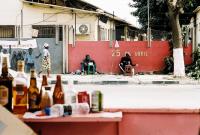 Luanda 2005. Some predators arrive possessed by amino acids of opportunities. It is the beginning of a series of projects and businesses, the rules are drawn with which wild capitalism will be mercilessly ingrained. Consolidated peace, will and dynamism, spirit of reconstruction. One invests in the country with economic growth potential, rich in natural resources where no one is out to lose.
Luanda 2005. Some predators arrive possessed by amino acids of opportunities. It is the beginning of a series of projects and businesses, the rules are drawn with which wild capitalism will be mercilessly ingrained. Consolidated peace, will and dynamism, spirit of reconstruction. One invests in the country with economic growth potential, rich in natural resources where no one is out to lose.
City
01.10.2010 | by Marta Lança
 This article asserts that names are an important aspect of any language. It argues that they act as a summary statement of the lives of the named and or those who give the names. The paper further observes that names that the Shona give are an indicator of their response to their situation in life. The situation includes success, failure and misfortune. The paper also observes that some names start off as nicknames and end up becoming family names. It again highlights that some names are not permanent, especially to the younger ones. They can assume new ones, especially with the passage of time due to changed circumstances like when one assumes a titular name, especially when she or he becomes chief or head of a clan.
This article asserts that names are an important aspect of any language. It argues that they act as a summary statement of the lives of the named and or those who give the names. The paper further observes that names that the Shona give are an indicator of their response to their situation in life. The situation includes success, failure and misfortune. The paper also observes that some names start off as nicknames and end up becoming family names. It again highlights that some names are not permanent, especially to the younger ones. They can assume new ones, especially with the passage of time due to changed circumstances like when one assumes a titular name, especially when she or he becomes chief or head of a clan.
To read
25.09.2010 | by Shumirai Nyota
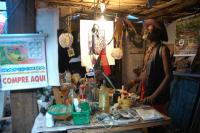 Mestre Paulo Kapela takes an exceptional position with his life and work within the artworld of Luanda, Angola's booming capital. The artist is a fugitive in his own country, a Mukongo from Uige and came to Luanda in 1996. Today he is a kind of artistic and spiritual master for the younger artist generation, even if he barely speaks Portuguese, but French. He became a role model with his unorthodox way of living and his personal universe, but also with his unique way of art-production through a combination of disparate objects and the creation of new contexts.
Mestre Paulo Kapela takes an exceptional position with his life and work within the artworld of Luanda, Angola's booming capital. The artist is a fugitive in his own country, a Mukongo from Uige and came to Luanda in 1996. Today he is a kind of artistic and spiritual master for the younger artist generation, even if he barely speaks Portuguese, but French. He became a role model with his unorthodox way of living and his personal universe, but also with his unique way of art-production through a combination of disparate objects and the creation of new contexts.
Face to face
23.09.2010 | by Nadine Siegert
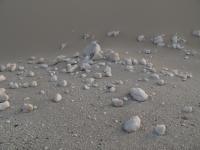 I can say, perhaps, that this trip has increased our awareness of the uncontrollable aspects of nature (the Icelandic volcano has now served notice to the oblivious) and revealed to us the existence of populations that are able to combine complex social organization and ownership of simple natural resources, which can only be the result of their deep knowledge of the territory.
I can say, perhaps, that this trip has increased our awareness of the uncontrollable aspects of nature (the Icelandic volcano has now served notice to the oblivious) and revealed to us the existence of populations that are able to combine complex social organization and ownership of simple natural resources, which can only be the result of their deep knowledge of the territory.
To read
22.09.2010 | by Cristina Salvador
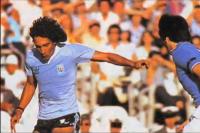 Since its launch, the DOCKANEMA Festival has aimed to offer the different audiences in Maputo the twin opportunities of becoming acquainted with the best that is being produced in the world of documentary films and of taking a break from the run-of-the mill audiovisual diet that is available for the rest of the year.
Since its launch, the DOCKANEMA Festival has aimed to offer the different audiences in Maputo the twin opportunities of becoming acquainted with the best that is being produced in the world of documentary films and of taking a break from the run-of-the mill audiovisual diet that is available for the rest of the year.
Afroscreen
20.09.2010 | by Pedro Pimenta
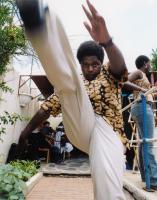 "Africa: See You, See Me!" portrays the history of African photography and its influence on non-African imaginings of Africa and the African diaspora in all their diversity. Together, the photographs are texts of African subjectivities, archives of history and societies in the making, and methods for understanding how images contribute to emancipation.
"Africa: See You, See Me!" portrays the history of African photography and its influence on non-African imaginings of Africa and the African diaspora in all their diversity. Together, the photographs are texts of African subjectivities, archives of history and societies in the making, and methods for understanding how images contribute to emancipation.
I'll visit
20.09.2010 | by Awam Amkpa
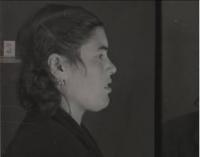 Among the artistic and other disciplines that pursue the representation of reality, the documentary film is most certainly one of those that raise the most questions. Traditionally favouring a fragmented glimpse of the world around us, and of what arises from events, documentary films today pose problems and challenges for us, with the added difficulty of both attempting to fit it in to some predetermined type and of interpreting its message.
Among the artistic and other disciplines that pursue the representation of reality, the documentary film is most certainly one of those that raise the most questions. Traditionally favouring a fragmented glimpse of the world around us, and of what arises from events, documentary films today pose problems and challenges for us, with the added difficulty of both attempting to fit it in to some predetermined type and of interpreting its message.
Afroscreen
20.09.2010 | by Francisco Noa
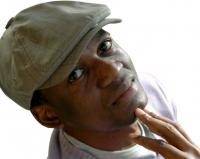 The book has received critical acclaim as a work by an African writing soberly on “such things”, in “journalistic language, backed by rigorous research.” It is a first in terms of its internal discourse, since it provides us “with a view of an African thinker and fighter from an African perspective."
The book has received critical acclaim as a work by an African writing soberly on “such things”, in “journalistic language, backed by rigorous research.” It is a first in terms of its internal discourse, since it provides us “with a view of an African thinker and fighter from an African perspective."
Face to face
18.09.2010 | by Marta Lança